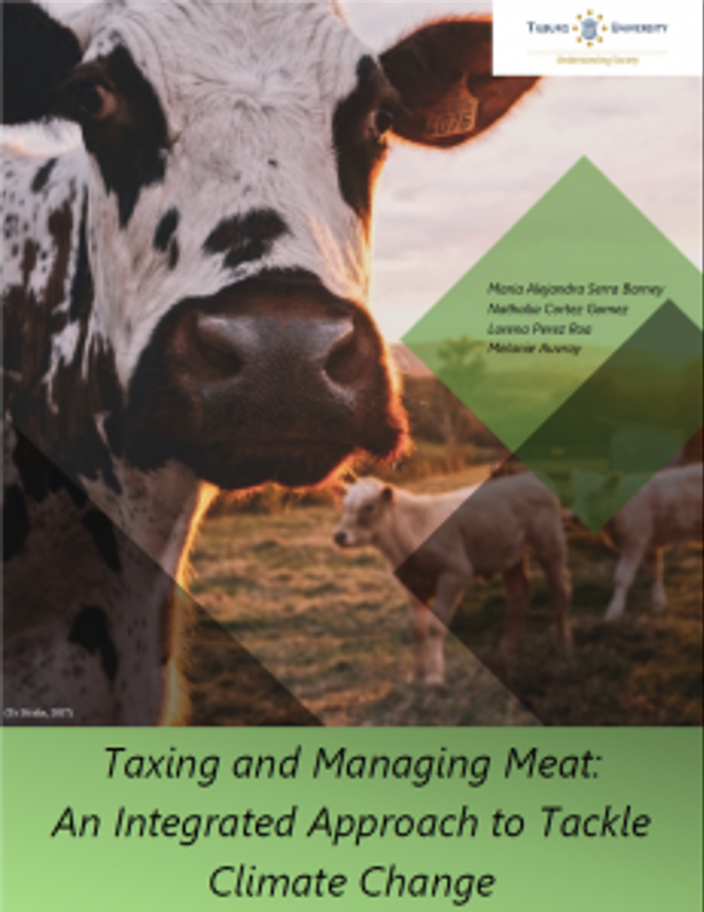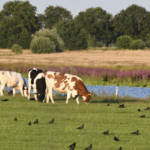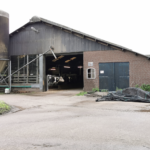(First published on August 26, 2019)
By Maria Alejandra Serra Barney, Nathalia Cortez Gomez, Lorena Perez Roa and Melanie Auvray (Alumni Tilburg Law School)
A few months ago, a team of four master students from Tilburg University participated in the Geneva Challenge 2018 on Climate Change. Our proposal aimed to tackle greenhouse gas emissions of the livestock industry, by creating a Global Tax Meat Scheme, that would allow countries from all over the world to have a profound transition to a cleaner industry while achieving a change on consumer’s behavior.
Climate Change is one of the biggest challenges of our generation. Action and cooperation from every country is needed, as well as from every sector and industry. While several actions to mitigate Climate Change have been developed in the most acknowledged pollutant industries, such as transportation, mining, or product manufacturing, the severe environmental impacts of the livestock industry have managed to remain in the shadows. Livestock industry alone is responsible for 14.5% of the annual worldwide Greenhouse Gas (GHG) emissions of Carbon Dioxide (CO2), Methane (CH4) and Nitrogen Dioxide (N2O), exceeding the emissions produced by the entire global transportation sector[1]. Nevertheless, a survey developed by Chatham House along with the Glasgow University in 2014[2], revealed that livestock sector is not recognized by people as a contributor to climate change[3]. As a matter of fact, one-quarter of people considered that ‘meat and dairy production contributes either little or nothing to climate change’[4].
Accordingly, and contrary to popular belief, the livestock industry is responsible for a large amount of the global Greenhouse Gas (GHG) emissions, which are generated through animal physiology (enteric fermentation, respiration and excretions), animal housing, feed crops, manure handling, processing of livestock products and bi-products, transportation and land use for livestock production (deforestation, desertification)[5]. This should not come as a surprise, considering its strong place in the economies of both developed and developing countries, as the main supplier of global calories, proteins, and essential micronutrients[6]. Likewise, livestock production is a good alternative in some developing countries that have difficulty growing crops and need to ensure the nutrition of their population[7], however relying almost exclusively in livestock products entails risks for human health and food security itself. The consumption of meat in developed countries is five times higher than in the developing countries[8], which increases the risk of colorectal cancer, pancreatic cancer and prostate cancer[9]. According to the World Health Organization (WHO), red meat (beef, veal, pork, lamb, mutton, horse and goat) has been classified as Group 2A: “probably carcinogenic to humans”; and processed meat (‘hot dogs’, ham, sausages, corned beef, beef jerky, canned meat and meat-based preparations and sauces) as Group 1: “carcinogenic to humans”[10], just as tobacco smoking and asbestos. This is why the WHO stresses the importance of the reduction on consumption of processed meat[11], which makes the leading role that meat products have in food security nowadays questionable.
In addition, the increase in the global temperature will have a direct impact on the health and life of livestock animals[12]. According to experts, the rise in the temperature will enable the acceleration in the growth of pathogens and parasites[13], which might generate shifts in disease spreading, outbreaks of severe diseases or even introduce new ones[14], increasing the risk of morbidity and death of livestock. Therefore, relying on livestock products to guarantee the food security in the world might lead to a food crisis in the future.
For environmental, health and food security reasons, livestock production should be limited and regulated. However, when it comes to international environmental treaties and agreements, even though there is a commitment and a mandate for countries to reduce GHG emissions, livestock industry is not really targeted, even though the projections indicate that animal product consumption will continue to increase[15]. Indeed, UNFCCC and Kyoto Protocol only formulate a fragmented set of rules’[16] and the Paris Agreement gives general recommendations that prioritize food security rather than targeting livestock industry. Regarding the health and food security issues related to the livestock industry, some countries are already using taxation to encourage healthy eating habits on its population, for instance by raising the prices of sugary soft drinks or sweets. Nevertheless, this approach has never been used on livestock products that, as it was explained before, are known to cause several health issues when consumed in excess.
In this sense, a study on the results on taxing beef, pork and chicken[17] in Denmark, succeeded to prove that a possible tax on meat would reduce GHG emissions between 10.4% and 19.4% for an average household[18]. However, we believe that these figures are not enough. Our proposal for the Geneva Challenge 2018 consisted in the establishment of a Global Meat Tax Scheme, which would consider the application of taxes in developed countries and levied on the consumers in order to directly induce changes in meat consumption. It should be collected by national authorities which must ensure that tax revenues are given back to specific actors so they can invest in the development of eco-efficient technologies to support technological improvements of the livestock industry management, or to invest in high protein food alternatives[19]. Likewise, governments shall cooperate with international organizations in order to promote and support the transition into cleaner technology and farming processes in developing countries .
To make sure that tax revenue funds are safe and utilized solely for the intended purposes, we suggest the utilization of blockchain technology, which would enhance the security of the scheme, guaranteeing the transparency of all transactions being made, and as a consequence promoting trust among governmental entities and individuals. Likewise, States would be under the monitoring and supervision of an international authority, which would assess the compliance of the States and the adequate utilization of the funds.
We invite you to read our full project report for further explanations on this “Global Meat Tax Scheme” and its complementary adaptation and mitigation measures which would allow countries from all over the world to have a profound transition of the industry to cleaner livestock management while achieving a change on consumer’s behavior.
[1] M. Rojas-Downing et al, Climate Change and livestock: Impacts, adaptation and mitigation. (Climate Risk Management, 2017) 152
[2] Rob Bailey, Antony Froggatt and Laura Wellesley, Livestock – Climate Change’s Forgotten Sector Global Public Opinion on Meat and Dairy Consumption (2014)<https://www.chathamhouse.org/sites/files/chathamhouse/field/field_document/20141203LivestockClimateChangeForgottenSectorBaileyFroggattWellesleyFinal.pdf> accessed 16 April 2018
[3] Rob Bailey, Antony Froggatt and Laura Wellesley, Livestock – Climate Change’s Forgotten Sector Global Public Opinion on Meat and Dairy Consumption (2014)<https://www.chathamhouse.org/sites/files/chathamhouse/field/field_document/20141203LivestockClimateChangeForgottenSectorBaileyFroggattWellesleyFinal.pdf> accessed 16 April 2018
[4] Rob Bailey, Antony Froggatt and Laura Wellesley, Livestock – Climate Change’s Forgotten Sector Global Public Opinion on Meat and Dairy Consumption (2014)<https://www.chathamhouse.org/sites/files/chathamhouse/field/field_document/20141203LivestockClimateChangeForgottenSectorBaileyFroggattWellesleyFinal.pdf> accessed 16 April 2018
[5] M. Rojas-Downing et al, Climate Change and livestock: Impacts, adaptation and mitigation. (Climate Risk Management, 2017) 151.
[6] Philip Thornton, Mario Herrero and Polly Ericksen, Livestock and climate change (2011) Livestock Exchange Issue Brief 3
[7] Ibid
[8] Ibid
[9] World Health Organization, Q&A on the carcinogenicity of the consumption of red meat and processed meat (2015) <http://www.who.int/features/qa/cancer-red-meat/en/> accessed 22 April 2018
[10] Ibid
[11] Ibid. Cf: “The IARC Working Group considered more than 800 different studies on cancer in humans (some studies provided data on both types of meat; in total more than 700 epidemiological studies provided data on red meat and more than 400 epidemiological studies provided data on processed meat)”
[12] Alessandro, Nardone et al., Effect of climate changes on animal production and sustainability of livestock system(2010) LIVEST SCI. 57, 69 <10.1016/j.livsci.2010.02.011> Accessed 15 April 2018.
[13] C.D. Harvell et al., Climate warming and disease risks for terrestrial and marine biota (2002) Science 296 <https://people.ucsc.edu/~cwilmers/ENVS220/Harvell%20et%20al%202002%20Science.pdf> Accessed on 23 April 2018
[14] P.K. Thornton et al., The impacts of climate change on livestock and livestock systems in developing countries: A review of what we know and what we need to know (2009) ILRI <https://www.sciencedirect.com/science/article/pii/S0308521X09000584> Accessed on 25 April 2018
[15] European Parliament, What if animal farming were not so bad for the environment (2017) <http://www.europarl.europa.eu/RegData/etudes/ATAG/2017/598619/EPRS_ATA(2017)598619_EN.pdf> accessed on 05 May 2018
[16] Bob O’Sullivan and Charlotte Streck, Forestry and Agriculture under the UNFCCC: A Jigsaw Waiting to be Assembled? (The Oxford Handbook of International Climate Change Law, 2016)
[17] Sarah Sall, Ing-Marie Gren, Effects of an environmental tax on meat and dairy consumption in Sweden (2015) Food Policy 41
[18] Louise Edjabou, S. Smed, The effect of using consumption taxes on foods to promote climate friendly diets and the case of Denmark (2013) Food Policy 39, 84-96.
[19] Kelechi E Nnoaham et al, Modelling income group differences in the health and economic impacts of targeted food taxes and subsidies (2009) OJLSclass=WordSection2>



